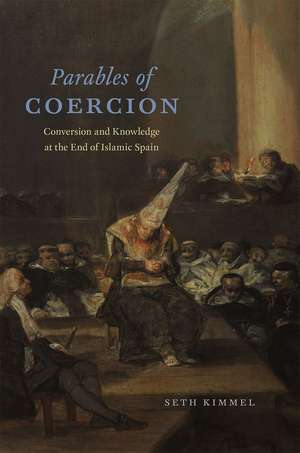Parables of Coercion: Conversion and Knowledge at the End of Islamic Spain
Autor Seth Kimmelen Limba Engleză Hardback – 12 oct 2015
In the sixteenth and seventeenth centuries, competing scholarly communities sought to define a Spain that was, at least officially, entirely Christian, even if many suspected that newer converts from Islam and Judaism were Christian in name only. Unlike previous books on conversion in early modern Spain, however, Parables of Coercion focuses not on the experience of the converts themselves, but rather on how questions surrounding conversion drove religious reform and scholarly innovation.
In its careful examination of how Spanish authors transformed the history of scholarship through debate about forced religious conversion, Parables of Coercion makes us rethink what we mean by tolerance and intolerance, and shows that debates about forced conversion and assimilation were also disputes over the methods and practices that demarcated one scholarly discipline from another.
In its careful examination of how Spanish authors transformed the history of scholarship through debate about forced religious conversion, Parables of Coercion makes us rethink what we mean by tolerance and intolerance, and shows that debates about forced conversion and assimilation were also disputes over the methods and practices that demarcated one scholarly discipline from another.
Preț: 232.40 lei
Preț vechi: 274.08 lei
-15% Nou
Puncte Express: 349
Preț estimativ în valută:
44.48€ • 45.95$ • 37.01£
44.48€ • 45.95$ • 37.01£
Carte indisponibilă temporar
Doresc să fiu notificat când acest titlu va fi disponibil:
Se trimite...
Preluare comenzi: 021 569.72.76
Specificații
ISBN-13: 9780226278285
ISBN-10: 022627828X
Pagini: 288
Dimensiuni: 152 x 229 x 28 mm
Greutate: 0.48 kg
Ediția:1
Editura: University of Chicago Press
Colecția University of Chicago Press
ISBN-10: 022627828X
Pagini: 288
Dimensiuni: 152 x 229 x 28 mm
Greutate: 0.48 kg
Ediția:1
Editura: University of Chicago Press
Colecția University of Chicago Press
Notă biografică
Seth Kimmel is assistant professor of Latin American and Iberian cultures at Columbia University. He lives in New York.
Cuprins
Introduction: To Join the Banquet
Chapter One
Legible Conversions
Chapter Two
Glossing Faith
Chapter Three
Polyglot Forms
Chapter Four
Heterodoxy in Translation
Chapter Five
War Stories
Chapter Six
Archives of Failure
Conclusion: Excavating Islamic Spain
Acknowledgments
Notes
Bibliography
Index
Chapter One
Legible Conversions
Chapter Two
Glossing Faith
Chapter Three
Polyglot Forms
Chapter Four
Heterodoxy in Translation
Chapter Five
War Stories
Chapter Six
Archives of Failure
Conclusion: Excavating Islamic Spain
Acknowledgments
Notes
Bibliography
Index
Recenzii
“Erudite and enlightening. . . . Highly recommended.”
"Parables of Coercion is an ambitious book of great breadth and complexity."
"In Parables of Coercion Kimmel succeeds wonderfully in excavating the intersection of early modern Spanish socioreligious and intellectual history and in deciphering its various discourses....Kimmel further uncovers the dialectical relationship between socioreligious discord and innovative cultural production by religious intellectuals in seventeenth-century Spain, and in the process he manages brilliantly to render meaningless the conventional, simplistic characterization of early modern Spain as a purely intolerant society. It was far more complicated during the sixteenth century afterlife of Islamic Spain than historiographical orthodoxy suggests."
"Kimmel’s elegant arguments go a long way to offering alternatives to triumphalist or defeatist narratives and anachronistic paradigms that have dominated early modern Hispanic studies for decades."
"Combining analytical perspectives of intellectual history and comparative literature, Seth Kimmel casts new light on the pastoral strategies and scholarly practices that theologians, church leaders, and crown officials mobilized to remove the 'danger' of heresy they associated with New Christians."
"Ranging across canon law, sacred philology, and history in sixteenth- and early seventeenth-century Spain, Seth Kimmel aims to demonstrate how the phenomenon of Muslim converts to Christianity was entertained by experts in those disciplines, as well as the ways in which the Morisco question affected the disciplines themselves."
"This thoughtfully argued and innovative book deals with religious coercion and scholarly innovation. Abandoning the well-trodden path that erroneously renders Spanish forms and narratives of religious discipline only comprehensible as religious intolerance, Kimmel explores the relationship between debates about religion on the one hand and the conditions of knowledge production on the other. He focuses on the debates over the relationship between form and content, heresy of the heart and public orthodoxy of the tongue to show that it was not simply a theological or political issue. As Kimmel shows, the breach between public ritual and private faith corresponded to a second and more troubling chasm between word and meaning."
"Kimmel has written a fascinating study of the learned cultures built out of a century of Spanish Christian intolerance toward Islam, beginning with the coerced conversion of Spain's Muslims to Christianity in the early sixteenth century, to the expulsion of the Moriscos (as the converts and their descendants were called) in the early seventeenth. He shows us how the evolving 'Morisco question' animated the emergence of disciplines such as philology, history, theology, political theory, and economics. In the process, he provides us with an alternate and disquieting history of our own scholarly, political, and religious practices."
"Parables of Coercion is a fascinating and important work, participating in some of the most crucial conversations now taking place within Jewish and Islamic studies, as well as at the crossroads of Iberian and New World studies. While Kimmel’s book will be read eagerly by specialists in these fields, its impact will stretch far beyond, attracting a readership interested in how we became the kind of people we are today, in terms of religion, secularism, and modernity itself."
"Seth Kimmel’s compelling study offers an entirely new angle on the Morisco question, one which explores the relationships between coercion and conversion and religious reform and scholarly innovation."
"Drawing together both more and less well-known figures and debates in insightful ways, Parables of Coercion vividly demonstrates the variety and range of early modern Spanish intellectual culture and thus offers a genuine contribution to the field."
